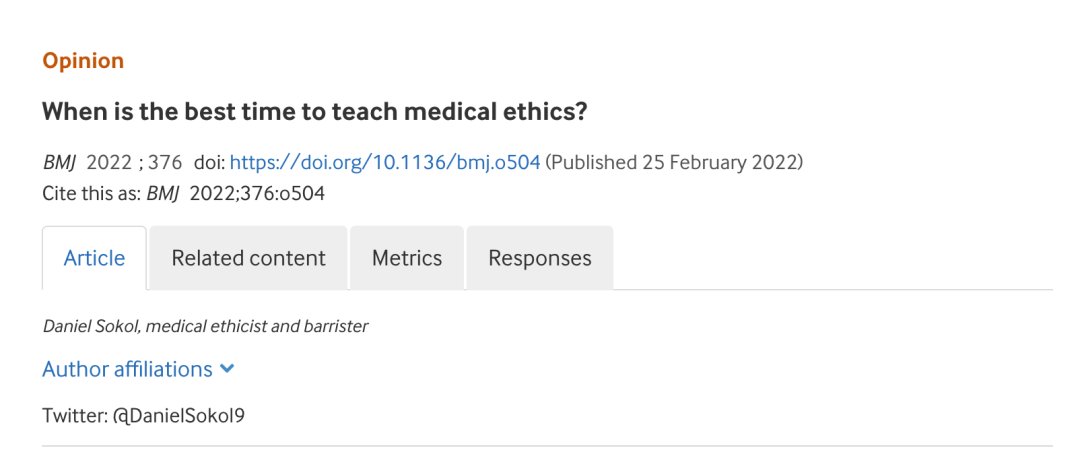- · 中国医学伦理学版面费是[06/30]
- · 《中国医学伦理学》投稿[06/30]
- · 《中国医学伦理学》期刊[06/30]
教授医学伦理学的最佳时间是什么时候?
作者:网站采编关键词:
摘要:Full Text Medical ethics education needs a major overhaul. In my view, there is too much medical ethics teaching in the early years of medical school and too little after qualification, when it truly matters. During a medical conference in

Full Text
Medical ethics education needs a major overhaul. In my view, there is too much medical ethics teaching in the early years of medical school and too little after qualification, when it truly matters.
During a medical conference in London, a neurosurgical trainee approached me after my talk on medical ethics. When I asked him if he was taught the subject at medical school, he answered “Yes, but I can't remember any of it. We just had to learn things by heart for the exam. Medical ethics is only relevant when you start practising.” This observation, which I had heard many times from other doctors, took me back to the time when, as a Lecturer in Ethics, I had to teach end-of-life ethics to first year medical students. I remember thinking that this was premature, like teaching a student how to do a Whipple procedure. Most of the audience had never seen a seriously ill patient and it would be years before they would have sufficient seniority to be involved in the life-and-death decisions we were discussing.
When I last taught ethics to students in 2009, most of the ethics teaching took place in the first two years of the medical degree. Ironically, the closer students got to qualification the less ethics teaching they received.
This makes little sense. The best time to teach medical ethics is shortly before qualification and, better still, post-qualification, when doctors are in practice and can immediately apply what they learn to their clinical work. Only then does medical ethics, free from the shackles of impending exams, come to life as a relevant, practical discipline.
In medical school, the priority for most students is passing exams. I remember one bold student in a lecture asking, unashamedly, “Will this be in the exam?” I was disappointed at the time but, when it was my turn to learn vast amounts of law as part of my law-conversion course years later, I sympathised with the student. There is so much to memorise that we need to be selective. The average student does not think “I need to learn this to become a better doctor” but “I need to learn this to pass the exam in 3 weeks' time.” Anything that is not examined is, at best, a distraction from what is essential and, at worst, a waste of time.
There is a place for medical ethics in the undergraduate curriculum. Students must understand that medicine is, at heart, a moral enterprise and the high ethical standards expected of students and doctors. They should also be taught the fundamentals of consent, confidentiality, and issues they are likely to encounter on their placements and their first year of practice.
However, the majority of medical ethics teaching should take place post qualification, with real life cases to illustrate the application of ethical principles or norms to the concrete situation. There should be a minimum number of ethics sessions that doctors should attend. This already exists at the Bar, with the Bar Standards Board requiring all barristers within their first three years of practice to undertake three hours of ethics. If the General Medical Council (GMC) had such a requirement—although with greater hours—Royal Colleges, deaneries, and hospital trusts would arrange more ethics sessions, doctors would benefit from practical ethics education, and the discipline would shed its unfair reputation as dry and impractical.
全文翻译(仅供参考)
医学伦理学教育需要大改革。在我看来,医学院早期的医学伦理学教学太多了,而在真正重要的时候,医学伦理学的教学太少了。
在伦敦的一次医学会议上,一位神经外科实习生在我谈论了医学伦理之后找到了我。当我问他是否在医学院教过这门课时,他回答说:“是的,但我什么都不记得了。为了考试,我们只需要背诵一些东西。只有当你开始练习时,医学伦理才有意义。” 这个我从其他医生那里多次听到的观察结果让我回到了那个时候,作为一名伦理学讲师,我不得不向一年级医学生教授临终伦理学。我记得当时认为这还为时过早,就像教学生如何进行 Whipple 手术一样。大多数观众从未见过重病患者,而且他们还需要多年的时间才能有足够的资历参与我们正在讨论的生死攸关的决定。
当我上次在 2009 年向学生教授伦理学时,大部分伦理学教学发生在医学学位的前两年。具有讽刺意味的是,学生越接近资格,他们接受的道德教育就越少。
这没什么意义。教授医学伦理的最佳时间是在获得资格之前不久,最好是在获得资格之后,那时医生在实践中并且可以立即将他们学到的知识应用到临床工作中。只有这样,医学伦理才能摆脱即将到来的考试的束缚,成为一门相关的实用学科。
在医学院,大多数学生的首要任务是通过考试。我记得一位大胆的学生在一次讲座中毫不羞愧地问:“这会在考试中出现吗?” 当时我很失望,但几年后轮到我学习大量法律作为我的法律转换课程的一部分时,我同情这位学生。要记住的东西太多了,我们需要有选择性。一般学生不会认为“我需要学习这个才能成为一名更好的医生”,而是“我需要学习这个才能在 3 周内通过考试”。任何没有被检查的东西,充其量只会分散对本质的注意力,最坏的情况是浪费时间。
文章来源:《中国医学伦理学》 网址: http://www.zgyxllxzz.cn/zonghexinwen/2022/0325/536.html
上一篇:理性认识科技伦理学的三个维度
下一篇:山东大学齐鲁医院俞能旺当选为山东省医学伦理